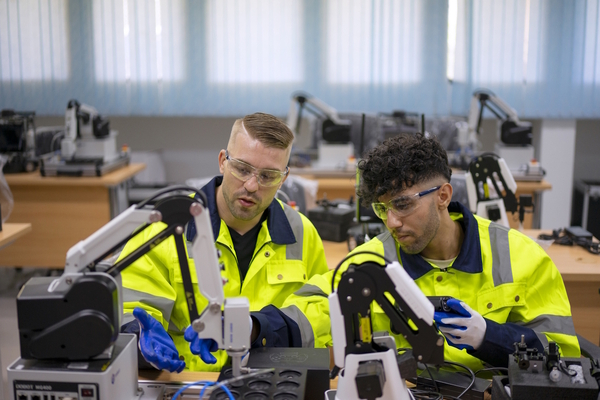Driving innovation with private AI

Joe Baguley at Broadcom describes four ways that private AI puts organisations in the driving seat for innovation
Generative AI’s mainstream debut has accelerated enterprise AI growth in the last year. Companies and governments are aggressively pursuing AI strategies, driven by potential benefits and competitive pressures. IDC predicts AI spending to grow from $175.9 billion in 2023 to $509.1billion in 2027 (30.4% CAGR).
In the UK, this investment in AI is critical to the new Government’s underlying mission of growth. The public and private sector alike are in search of tools that are both flexible and secure, enabling them to capitalise on the benefits of AI, without having to compromise on the integrity of their existing infrastructure.
Private AI, custom-built for exclusive organisational use, is emerging as this very tool for unlocking growth – allowing enterprises to maintain control over their AI models and the data they feed into them.
Private AI takes a platform approach, which enables organisations to intelligently pool their AI capacity and securely share it among AI applications and models. With this approach, organisations can make a singular bet on a platform today, and easily replace or add new models in the future as both business needs and the technology evolve.
Here are four ways Private AI puts UK businesses in the driving seat for innovation.
1. Secure by design
There is an important focus in the UK on the cyber security of critical national infrastructure, with the Cyber Security and Resilience Bill being one of the few new laws announced in the King’s Speech. This focus on security is being seen across other sectors too. As businesses become increasingly data-led, they need to know where their data is being held at all times – and how it is being secured.
Private AI gives organisations the freedom to choose where to store their data together with the ability to control how it interacts with AI models that physically reside adjacent to their data. This could range from on-premises environments to private clouds, at the edge or in cloud data centres. This approach ensures that IT teams can maintain control of data and can ensure the right security infrastructure is in place at all times.
Private AI also allows organisations to bring AI to the data, rather than vice versa. Enterprises have complete ownership of their AI models and can control how much data they feed the technology, and where and when to limit access. This allows for real-time management of all new technologies and innovations added to their tech infrastructure, making sure IT teams can secure vulnerable endpoints as well as oversee the secure management of confidential data.
2. Prioritising local
Innovation with AI often involves data being pushed and stored beyond national boundaries – usually under the control of a US-based hyperscaler. Private AI allows for local data storage and contributes to the creation of a local virtuous economy.
For example, a local UK hospital developing an AI model to accelerate cancer research will be using data locally stored in a UK data centre/ private cloud where it will be feeding the local economy, paying local taxes, complying with the local regulations and even employing and teaching local experts.
This brings a whole host of opportunities not just to the organisation looking to adopt a Private AI model, but to the surrounding community as well. It also directly plays into UK’s aim to enhance local productivity and stimulate economic growth. In fact, according to the International Monetary Fund (IMF), the UK could experience annual productivity gains of up to 1.5% with the increased development and adoption of AI technologies.
3. Navigating the regulatory landscape
Acting as an antidote to potential innovation constraints, Private AI provides the opportunity for companies to digitally transform within the existing regulatory landscape while also driving local economies and delivering against national interest.
As the UK develops its framework for AI safety, the regulatory landscape for AI is as nascent as the technology itself, and as such, the impact of future regulations isn’t fully known. As a result, AI innovation at the enterprise level needs to be open and interoperable.
Private AI models have been designed to be flexible, with global thinking on regulatory standards baked into the technology. Given the trackable nature of the data used in Private AI models, organisations can ensure all data sovereignty standards are met. This will future proof any new technology against new regulations, while also removing any roadblocks for organisations looking to use AI.
4. Future-proof tech infrastructures
Companies don’t have to make the same mistakes they made with the rush to move to public cloud, where they may have adopted the technology without considering long-term tech plans or evolving regulatory standards. The AI landscape is evolving and there are more AI providers that will enter the market beyond the top providers.
The use of Private AI ensures that the next phase of infrastructure built by enterprises is flexible and mouldable – to avoid vendor lock-in and future proof its compatibility with evolving technologies and AI providers. You don’t want to end up with another legacy system to navigate three years down the line. Your AI platform should be equally agile as AI itself, with the ability to replace – at the speed of software – models and services that are no longer effective or compliant.
Empowering organisations with private AI
When it comes to AI, there is no longer any reason to debate trade-offs in choice, privacy, and control. Private AI empowers organisations with all three, enabling them to accelerate AI adoption while future proofing their AI infrastructure.
Sustainable innovation is not just about safeguarding data; it is about strategically unifying AI innovation with compliance and data privacy. This approach empowers businesses to responsibly harness the power of AI and could pave the way for the UK becoming a critical AI player in the future.
Joe Baguley is CTO EMEA at Broadcom
Main image courtesy of iStockPhoto.com and Dragos Condrea

Business Reporter Team
Most Viewed
Winston House, 3rd Floor, Units 306-309, 2-4 Dollis Park, London, N3 1HF
23-29 Hendon Lane, London, N3 1RT
020 8349 4363
© 2025, Lyonsdown Limited. Business Reporter® is a registered trademark of Lyonsdown Ltd. VAT registration number: 830519543





